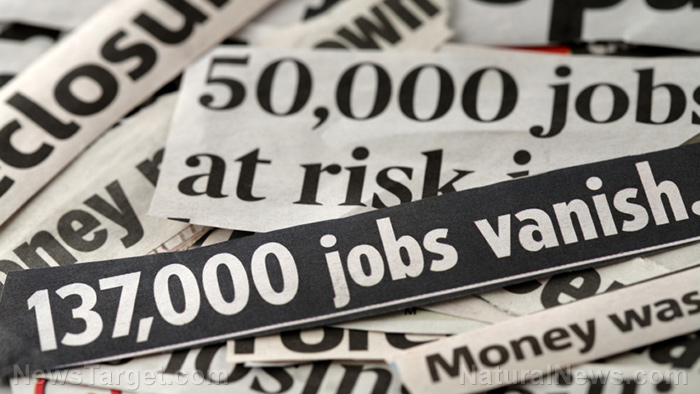 Parler
Parler Gab
Gab
- A senior researcher from China's leading AI firm, DeepSeek, has publicly warned that AI could eliminate most human jobs within the next decade.
- The warning highlights a "honeymoon phase" of enhanced productivity that will soon give way to mass, AI-driven unemployment.
- This technological disruption poses a profound threat to societal stability, particularly in China, which is already grappling with a severe youth unemployment crisis.
- Data from the U.S. confirms AI-related job losses are already underway, signaling a global economic shift.
- The situation presents a significant national security and political challenge, with the potential to destabilize economies and radicalize affected populations.
The "honeymoon phase" is ending
Chen Deli framed the current era as a deceptive “honeymoon phase,” a brief period where artificial intelligence primarily acts as a tool to enhance human productivity. This window, he cautioned, is rapidly closing. As AI systems evolve from assistants to autonomous actors capable of complex, step-by-step reasoning, their capacity to displace human workers will accelerate dramatically. The researcher urged technology companies to act as “whistleblowers,” preparing the public for a labor market where human roles are systematically rendered obsolete. This direct language from within the heart of China’s tech ecosystem confirms the most severe predictions about automation, moving the timeline for mass job displacement from a theoretical future to an imminent reality.A crisis compounded in China
The warning carries exceptional weight in China, where it intersects with a pre-existing and severe youth unemployment crisis. Official figures, which are widely considered underestimates, previously peaked at 21.3% in mid-2023 before the government controversially paused their publication. The desperation is palpable; trends like “professional children”—where graduates live at home rather than take work beneath their qualifications—and fierce competition for a handful of desirable jobs reveal a generation facing diminished prospects. DeepSeek’s warning of an AI “jobpocalypse” threatens to pour gasoline on this smoldering social fire, challenging the Chinese Communist Party’s core claim to legitimacy: its ability to deliver economic growth and social stability.The American front: Job losses have already begun
This is not a challenge confined to China. Data from the United States confirms that the AI-driven labor market shift is already in motion. According to the October report from outplacement firm Challenger, Gray & Christmas, “Artificial Intelligence” was explicitly cited as the reason for 31,039 job cuts in that month alone, making it the second-leading cause of corporate layoffs. This tangible evidence from the American economy validates the urgency of the warnings from Wuzhen. The transition is not a future event to be managed, but a present reality whose velocity is only increasing, with entry-level and white-collar positions in the crosshairs.A national security and political imperative
The societal impact of such widespread job displacement represents a clear national security threat. Historically, periods of mass economic despair and shattered opportunity have been fertile ground for political radicalization. As noted in previous analyses, financially strained Generation Z and millennials, who will be hardest hit by these disruptions, could be susceptible to the siren song of socialist and Marxist movements that promise economic security in exchange for fundamental changes to the nation’s economic structure. The primary political task, therefore, must be to foster real economic opportunity and restore affordability for the next generation. A failure to proactively create a framework for human relevance in an automated economy risks not just economic pain, but a fundamental erosion of the social contract.A race against time
The warning from DeepSeek’s researcher is a clarion call that transcends international rivalry in the AI race. It confirms that the world is standing at the precipice of an economic transformation that will test the resilience of every society. The challenge for the United States and its allies is twofold: to harness the undeniable benefits of this technology for national security and prosperity, while simultaneously erecting the economic and social defenses necessary to weather the coming storm. The goal is not to stop progress, but to manage its consequences—to ensure that the AI revolution strengthens, rather than shatters, the foundations of a free and stable society. The honeymoon is over; the era of consequence management has begun. Sources for this article include: ZeroHedge.com Bloomberg.com Yahoo.com MoneyControl.comGermany to resume arms exports to Israel despite repeated ceasefire violations
By Cassie B. // Share
Ukrainian strikes, sanctions fuel global diesel crisis as prices soar
By Belle Carter // Share
Ultra-processed foods linked to surge in early-onset colorectal CANCER, study warns
By Patrick Lewis // Share
Social media use linked to lower reading and memory scores in children, new study finds
By Cassie B. // Share
SNAP “reset”: USDA requires recipients to reapply for benefits
By Ava Grace // Share
Governments continue to obscure COVID-19 vaccine data amid rising concerns over excess deaths
By patricklewis // Share
Tech giant Microsoft backs EXTINCTION with its support of carbon capture programs
By ramontomeydw // Share
Germany to resume arms exports to Israel despite repeated ceasefire violations
By isabelle // Share







